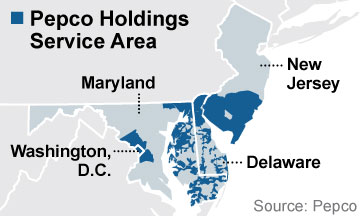Exelon Takeover of Pepco, Resurrected by D.C. Mayor, Still Fails the Public-Interest Test


Even in its latest guise, the proposed settlement of the Exelon-Pepco merger fails the public-interest litmus test.
We’ve filed public comment to that effect with the District of Columbia Public Service Commission today (and we’ve written a cautionary letter and memo to the D.C. City Council, which of course holds considerable political sway).
The gist of our warning comes down to this:
- The rejiggered deal only hides, for a few years, the true cost to ratepayers. While residential customers under the revised settlement endorsed by Mayor Muriel Bowser will not see their rates increase until March 2019, they will be hit at that time with the cumulative impact of three years’ worth of rate increases, which Pepco estimates at $25.6 million. Customers will also pay a 5 percent interest on any rate increase above $25.6 million. The short-term benefits of the new deal won’t outweigh those costs.
- The proposed settlement leaves Pepco ratepayers exposed to risks from a potential Exelon bankruptcy. Although the merger sets up a series of “ring-fence” provisions that are supposed to isolate Pepco from any financial distress at Exelon, our comments detail several deficiencies in these provisions. We note, for instance that in the ongoing bankruptcy case of Energy Futures Holdings in Texas, EFH has supported the dismantling of the ring fence around its subsidiary Oncor. There is nothing in this deal to prevent Exelon from taking a similar position.
- While the deal Bowser endorses would channel more money to the D.C. government, nothing in it fundamentally alters the inherent conflict of interest it embodies. Exelon has a fiduciary duty to ensure the financial viability of its struggling merchant electricity generation business, and will likely do so at the expense of Pepco ratepayers.
- Nothing in this new deal leads us to believe that Exelon has changed its hostile view of renewable energy. We continue to believe that Exelon would not be a willing partner in achieving the District of Columbia’s goal of 50 percent renewable energy generation by 2032.
The D.C. Public Service Commission is “the last man standing” against this merger. Exelon proposed buying Pepco Holdings—the utility that serves D.C. and parts of Maryland, Delaware and New Jersey—in 2014. The deal was approved by the Federal Energy Regulatory Commission and public service commissions of Maryland, Delaware and New Jersey—even against the advice of public-interest groups and the Maryland attorney general—and was rejected by the D.C. Public Service Commission this past August.
Bowser revived it by negotiating the settlement now before the D.C. Public Service Commission, which we hope will hew to the wisdom it expressed when it rejected the merger to begin with: “A utility that is a partner in the District is vastly preferable to a utility that must be continually compelled to further important District goals.”
Cathy Kunkel is an IEEFA energy analyst.














